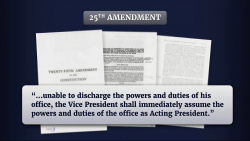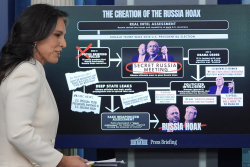America relies on Chinese minerals — a fact that the Chinese government is able to use as leverage in the US-China trade war.
Minerals are the newest front in US-China economic warfare. In recent months, the People’s Republic of China has accelerated its usage of mineral export controls to choke American access to critical minerals, prompting many policymakers to fear a complete Chinese embargo. But that’s a misunderstanding of Beijing’s goals. Instead, it’s become clear that Chinese policymakers are balancing strategic disruption with the desire to keep America dependent on Chinese markets.
If China were to entirely shut off exports to America, the US economy would lose the ability to manufacture essential military and commercial goods. But an embargo like this would also accelerate US efforts to find alternative sources of key inputs, reducing US demand for Chinese goods. That’s the last thing China wants.
China doesn’t want to crash our economy; it wants to keep us hooked in order to shape our policy. The selective usage of export controls keeps us reliant while demonstrating their leverage. And as long as Chinese imports are cheap and available, and America fails to develop domestic sources, their dominance will continue.
China’s recent restrictions on rare earth elements (REEs) are a perfect example. In April, China shut off rare earth element shipments and introduced a licensing regime to curtail largely heavy REE exports. PRC officials are pressuring companies in other countries, such as South Korea, not to export products that use restricted REEs.
That’s a problem for the United States. REEs are used in specialized magnets, cars, sensors, aircraft, and other advanced commercial technologies. They’re also vital for major weapon platforms such as Tomahawk missiles, Predator drones, and F-35 aircraft. For such critical hardware, we never should have become so reliant on China.
But geological reality will complicate the path to American REE production. Compared to light REEs, heavy REEs are less commonly found and less densely concentrated. Condensed heavy rare earth sources are most frequently contained within ionic clay deposits, which can be about forty times more bountiful than major REE sites.
America’s only REE mine, located at Mountain Pass in California, lacks a sufficient concentration of heavy rare earths to meet our needs. On the processing side, we’re still short on technical capabilities for separating our rare earth elements. This is true despite the fact that the Department of Defense has poured hundreds of millions of dollars into developing a native REE military supply chain.
Until that happens, we’re vulnerable to foreign interference, which the PRC is more than willing to execute. After productive negotiations in early May to reduce tariffs, China retained its export licensing regime. On May 30, without mentioning rare earths, President Trump accused China of violating the agreement. U.S. Trade Representative Jamieson Greer and Treasury Secretary Scott Bessent both raised concerns about China’s continued REE export controls. Validating those worries, automotive industry giants have warned of an impending magnet shortage that would crush American car manufacturing, and Ford temporarily closed a Chicago factory because of difficulties in accessing necessary magnets.
If the countries remain at an impasse over trade and minerals, we will see more industrial disruption and pressure on American policymakers, just as China intends.
First, it aims to cause strategic disruption without encouraging disengagement. Right now, American manufacturers are staring down the possibility of shuttering operations without access to Chinese magnets. But this won’t result in an immediate switch to American sourcing. The REE market is small and highly price-sensitive. If we start to develop alternative production, the PRC could start releasing REEs and magnets again, keeping America dependent.
Second, and perhaps even more importantly, China will use export controls as a signaling tactic. Consider the price spikes, factory closures, and supply delays that would accompany a shortage, then multiply that across the twenty-six critical minerals that China for which is our primary supplier. Beijing doesn’t actually need to sever all these supply chains; it just needs to signal the will and readiness to do so.
With such powerful leverage, China can play a role in determining American policy that approaches a veto power. If we rely on the PRC to provide us with raw materials necessary for our war-fighting capabilities, then our military operates only with their consent. As President Trump aims to reshape global trade in pursuit of America’s national interest, China’s ability to disrupt American car manufacturing is a powerful point of pressure.
The turmoil over rare earth elements should dispel policymakers’ fears of a complete Chinese embargo. Selectively applied pressure is enough to shape American foreign policy while keeping us within the Chinese mineral supply chain. To counter China’s leverage in future negotiations, American policymakers need to confront the PRC’s actual mineral strategy: perpetual American reliance.
About the Author: Farrell Gregory
Farrell Gregory is a non-resident fellow at the Foundation for American Innovation and the chief editor at the Oxford Emerging Threats Journal. As a Research Assistant at the Yorktown Institute, he’s published analyses of Chinese foreign policy and national security topics. You can read more of his work at @efarrellgregory on X.
Image: Shutterstock/Pla2na














